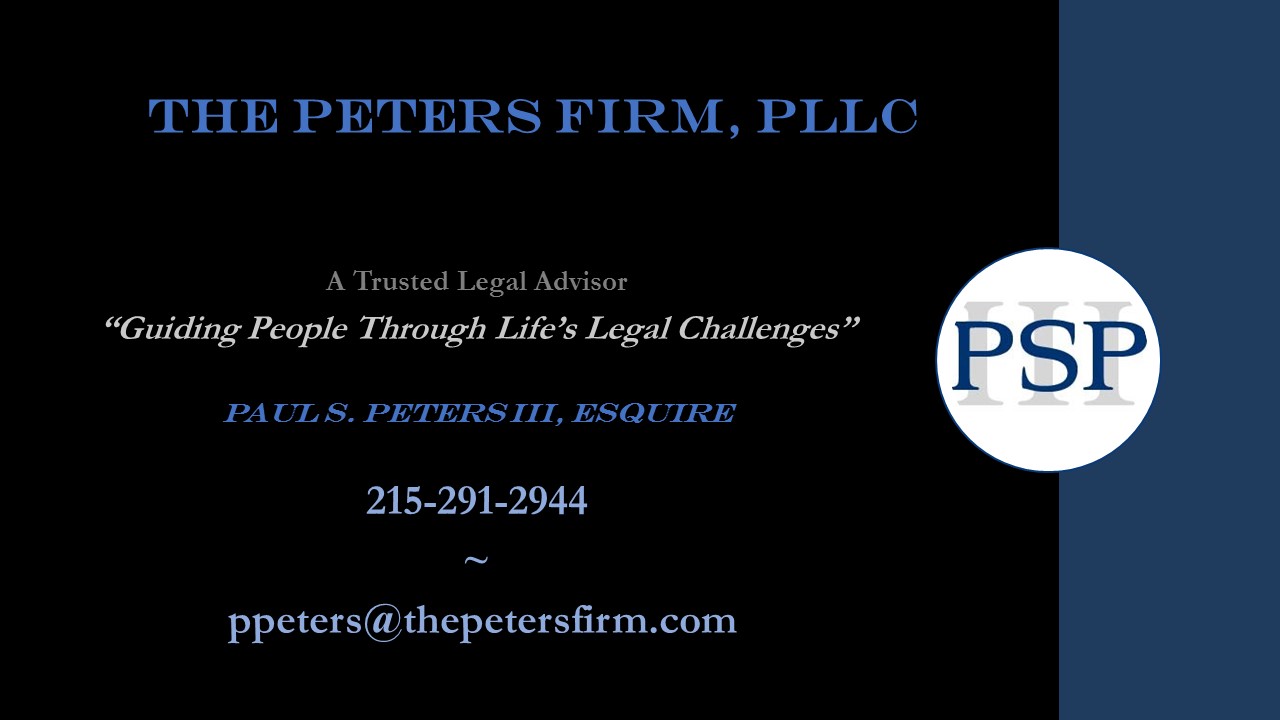Special Needs Trusts in Pennsylvania
What is a Special Needs Trust in Pennsylvania?
Special Needs Trusts in Pennsylvania are an invaluable Estate Planning tool allowing parents and caregivers to provide for a Child, Family Member, or Friend that has Special Needs. There are multiple requirements that must be met to create a Special Needs Trust in Pennsylvania. Once created, Special Needs Trusts in Pennsylvania can alleviate some financial responsibilities for your loved one with Special Needs and protect any government benefits he or she receives.
The Paramount reason for establishing a Special Needs Trust in Pennsylvania is to ensure the Special Needs individual is not disqualified from receiving government benefits and programs such as Medical Assistance, Social Security Income, Housing Assistance, and Food Stamps. If even a minimal inheritance is left to a Special Needs individual, that individual will lose any governmental benefits he or she receives which will be to his or her great detriment. A Special Needs Trust in Pennsylvania will alleviate this issue.
Special Needs Trusts in Pennsylvania Rules
A Special Needs Trust in Pennsylvania (SNT) is created with the resources of an individual with Special Needs and is used to assist and assure the individual qualifies for government assistance. Special Needs Trusts in Pennsylvania are established when a Parent, Caregiver, Family Member, or Friend of the Special Needs individual authorizes an agent (trustee) to oversee property and assets placed in trust to benefit the Special Needs individual. The purpose of a Special Needs Trust in Pennsylvania is to preserve a Special Needs individual’s right to receive governmental benefits.
Specific rules for a Special Needs Trust in Pennsylvania are:
- The Special Needs individual must be under the age of 65 when the SNT is created;
- Property or assets cannot be added to the trust after the Special Needs individual’s 65th birthday;
- The Special Needs individual cannot own more than $2,000 in assets;
- Assets one should be placed in a Special Needs Trust in Pennsylvania to preserve the Special Needs individual’s access to SSI or medical assistance are:
- Compensation from a settlement or lawsuit
- Inheritance proceeds and property
- Life Insurance Proceeds
- Assets received in a divorce settlement
- Gifts of Money and Real Estate
If a Special Needs individual receives one of the assets listed above and/or another type of lifetime gift outside of a Special Needs Trust in Pennsylvania, he/she can face tax repercussions. Every Special Needs Trust in Pennsylvania must contain a provision allowing the Department of Human Services (DHS) to seek reimbursement for medical assistance payments made on behalf of the Special Needs Trust beneficiary. Therefore, a Special Needs Trust in Pennsylvania must exercise caution to avoid becoming ineligible for medical assistance. Once a Special Needs individual’s medical assistance rights are terminated, it is difficult to reinstate them.
Special Needs Trust Expenditures
Any distributions made from a Special Needs Trust in Pennsylvania shall only be used to assist the Special Needs individual. Special Needs Trusts in Pennsylvania are typically used to provide funds for issues or activities not covered by government benefits. Expenditures a Special Needs Trust in Pennsylvania can be used for are:
- Wheelchairs, breathing apparatuses, hearing aids, and other types of medical equipment
- Educational items like tuition, textbooks, school supplies, and tutoring
- Cellular Phone bill
- Computer, including equipment and internet access
- Doctor and Dentist visits
- Television, Cable, and other similar forms of entertainment
- Furniture and other necessary household items
- Equipment needed to repair or renovate a home
- Health and life insurance plans
- Vacations and related expenses like plane tickets and hotel rooms
- Clothing
- Public Transportation or Rideshares (Uber, Lyft)
This is not an exhaustive list of items that may be considered as a permitted expense, just examples of the type of expenditures permitted.
If the Special Needs individual receives SSI, some basic expenses that should not be paid through a special needs trust without consultation and a substantial reason it is a necessity are:
- Cash given directly to the beneficiary for any purpose
- Food or groceries
- Restaurant meals (except if given as an occasional gift)
- Rent or mortgage payments
- Property taxes
- Homeowners or condo association dues
- Homeowners insurance if the insurance is a mortgage requirement
- Utilities such as electricity, gas, and water
- Utilities hookup or connection charges
Determining whether one can use the assets of a Special Needs Trust in Pennsylvania to purchase a home or car can be a complex situation. For example, if more than 15% of the funds in a Special Needs Trust in Pennsylvania are used to purchase a home, medical benefits may be negatively impacted. A Special Needs individual can only use Special Needs Trust funds in Pennsylvania to purchase one vehicle; purchasing a luxury vehicle may not be approved by a Pennsylvania court or Medicaid agency unless there is a compelling reason for the specific purchase. If these expenses are not handled correctly, a Special Needs individual will risk losing medical assistance benefits.
For the above reasons, it is vital to work with a trusted and experienced Pennsylvania Estate Planning Attorney who understands these complex rules and can help guide you through the administration of a Special Needs Trust in Pennsylvania.
If you have questions about or wish to set up a Special Needs Trust in Pennsylvania, please feel free to contact me for a FREE CONSULTATION at:
215-291-2944 or
ppeters@thepetersfirm.com




